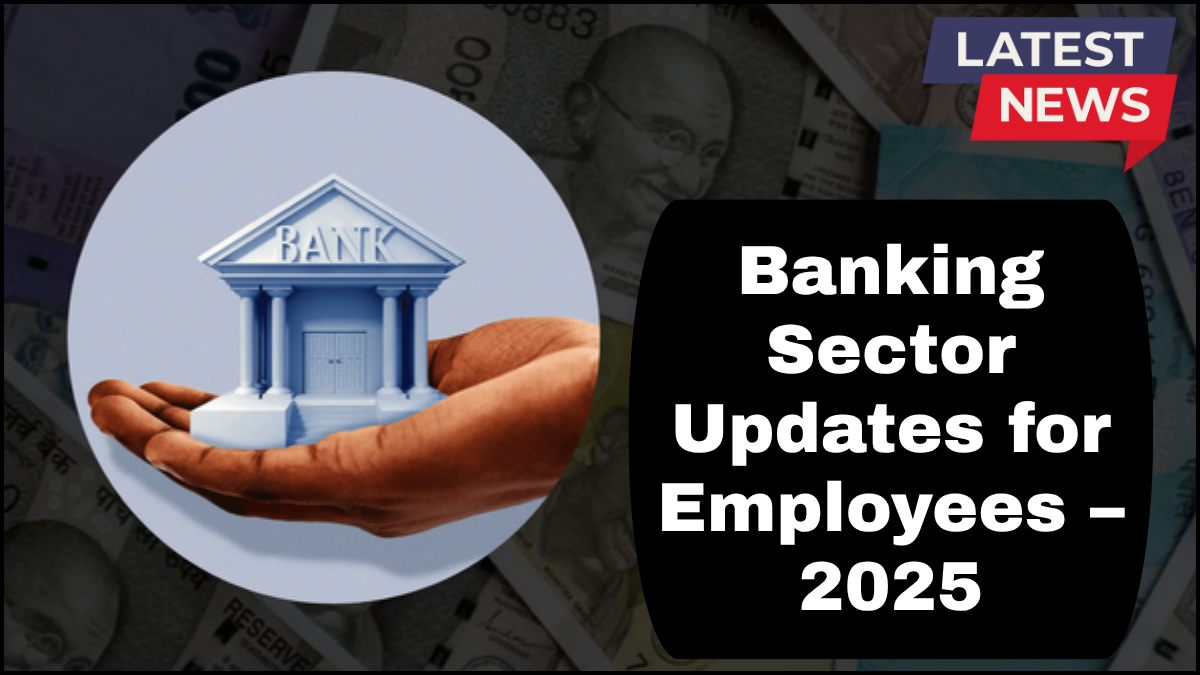The Banking Sector Updates 2025 bring a mix of transformation, technology, and workforce evolution. With digital acceleration, regulatory reforms, and strategic workforce planning at the core, employees across all banking tiers must stay informed and prepared. These changes aren’t just reshaping how banks operate—they’re redefining employee roles, expectations, and career growth pathways.

Here’s a comprehensive overview of what employees in the banking sector need to know in 2025.
Digital Transformation is Reshaping Every Role
Digital adoption is no longer optional. In 2025, banks continue to integrate artificial intelligence (AI), machine learning (ML), and robotic process automation (RPA) to streamline operations, reduce costs, and boost customer satisfaction. For employees, this means a shift from traditional banking tasks to more analytical and tech-supported roles.
Example:
Customer service departments are now blending AI chatbots with human agents. Employees must be proficient in navigating automated systems while handling complex queries.
Key Employee Impact:
-
Upskilling in data analytics and digital tools is essential.
-
Greater collaboration with IT and compliance teams.
-
Increased focus on value-added tasks instead of repetitive processes.
Workforce Reskilling & Role Reconfiguration
One of the most prominent Banking Sector Updates 2025 is the systematic reskilling of employees. As automation takes over transactional duties, banks are investing in their workforce through targeted learning and development programs.
What’s Changing:
-
Branch-level positions are evolving into financial advisory roles.
-
Risk management, cybersecurity, and compliance roles are gaining prominence.
-
Hybrid work models are becoming normalized, with a stronger emphasis on digital collaboration skills.
Bank Employee Takeaway:
To stay relevant, employees must continuously learn—whether through internal training, certifications, or self-initiated development.
Regulatory Shifts & Compliance Complexity
With the financial landscape evolving rapidly, regulators are tightening frameworks around cybersecurity, data privacy, and ESG (Environmental, Social, Governance) obligations.
Highlights from Financial News:
-
New ESG reporting requirements demand detailed disclosures.
-
Updated anti-money laundering (AML) protocols require real-time transaction monitoring.
-
Digital currencies and decentralized finance (DeFi) are prompting fresh compliance strategies.
Impact on Employees:
-
Greater collaboration between compliance officers and frontline staff.
-
Training sessions on new regulations are mandatory.
-
Cross-departmental communication skills are crucial.
Diversity, Equity, and Inclusion (DEI) at the Forefront
Banks are doubling down on DEI in 2025, recognizing that inclusive workforces lead to better decision-making and innovation.
Notable Initiatives:
-
Bias-free recruitment and promotion systems.
-
Leadership mentorship programs for underrepresented groups.
-
Transparent DEI performance metrics tied to executive KPIs.
Employee Insights:
-
DEI initiatives are no longer HR-led alone—they are embedded in business strategy.
-
Employees are encouraged to participate in resource groups and DEI training.
-
Performance reviews increasingly include DEI engagement.
Employee Well-being and Mental Health Support
Financial institutions are focusing on building healthier work environments. The post-pandemic era has made mental health a top priority, alongside traditional job perks.
Current Practices:
-
Flexible schedules and mental health days.
-
Access to confidential counseling services.
-
Wellness apps integrated with HR systems.
Why It Matters:
Increased productivity and job satisfaction directly correlate with better mental health support. This shift is not a trend but a permanent aspect of workplace culture in 2025.
Sustainable Banking Careers
With rising awareness around climate risk and responsible banking, employees are being trained to understand green finance, carbon credit systems, and sustainable investing.
Training Areas:
-
ESG integration in loan assessments.
-
Sustainability-linked bonds and funds.
-
Carbon footprint calculations in banking portfolios.
Professional Growth Opportunity:
Bankers who understand sustainability frameworks are in high demand. This area is rapidly becoming a critical skill set in career advancement.
FAQs – Banking Sector Updates 2025
Q1: What are the biggest changes in banking for employees in 2025?
The biggest changes include increased use of AI, regulatory updates, mandatory upskilling, and a growing emphasis on ESG and DEI.
Q2: How can bank employees stay updated with ongoing changes?
Regularly follow financial news, attend in-house training, and subscribe to industry publications or professional associations.
Q3: Are traditional banking jobs at risk due to automation?
Some roles are evolving, but not disappearing. Automation is shifting responsibilities toward more strategic and analytical tasks.
Q4: What skills should banking employees focus on in 2025?
Data analytics, cybersecurity, digital literacy, ESG knowledge, and interpersonal communication are top skills.
Q5: Will remote work remain a standard option?
Yes, hybrid models are increasingly popular. Flexibility is becoming a norm rather than a perk.
click here to learn more